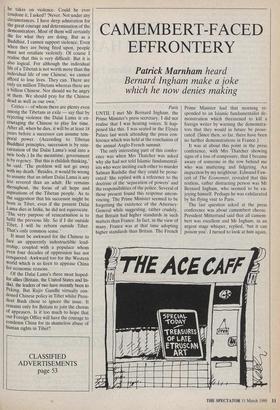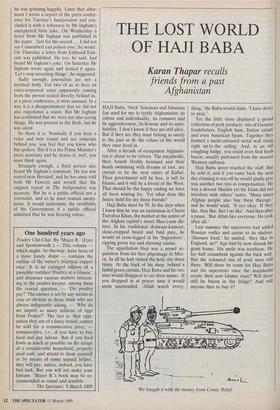CAMEMBERT-FACED EFFRONTERY
Patrick Marnham heard
Bernard Ingham make a joke which he now denies making
Paris UNTIL I met Mr Bernard Ingham, the Prime Minister's press secretary, I did not realise that I was hearing voices. It hap- pened like this. I was seated in the Elysee Palace last week attending the press con- ference which Was held at the conclusion of the annual Anglo-French summit.
The only interesting part of this confer- ence was when Mrs Thatcher was asked why she had not told Islamic fundamental- ists who were inciting each other to murder Salman Rushdie that they could be prose- cuted: She replied with a reference to the doctrine of the 'separation of powers' and the responsibilities of the police. Several of those present found this response uncon- vincing. The Prime Minister seemed to be forgetting the existence of the Attorney- General while suggesting, rather crudely, that Britain had higher standards in such matters than France. In fact, in the view of many, France was at that time adopting higher•standards than Britain. The French
Prime Minister had that morning re- sponded to an Islamic fundamentalist de- monstration which threatened to kill a foreign writer by warning the demonstra- tors that they would in future be prose- cuted. (Since then, so far, there have been no further demonstrations in France.)
It was at about this point in the press conference, with Mrs Thatcher showing signs of a loss of composure, that I became aware of someone in the row behind me who was muttering and fidgeting. An inspection by my neighbour, Edmund Faw- Cett of The Economist, revealed that this restless, rather distracting person was Mr Bernard Ingham, who seemed to be en- joying himself. Perhaps he was exhilarated by his flying visit to Paris.
The last question asked at the press conference was about camembert cheese. President Mitterrand said 'that all camem- bert was excellent and Mr Ingham, in an urgent stage whisper, replied, tut it can poison you'. I turned to look at him again,
he was grinning happily. Later that after- noon I wrote a report of the press confer- ence for Tuesday's Independent and con- cluded it with a reference to Mr Ingham's unexpected little joke. On Wednesday a letter from Mr Ingham was published in the paper. 'Just for the record ... I did not say Camembert can poison you', he wrote. On Thursday a letter from Edmund Faw- cett was published. He too, he said, had heard Mr Ingham's joke. On Saturday Mr Ingham wrote again and denied it again. 'Let's stop inventing things', he suggested.
Sadly enough, journalists are not a mystical body. For two of us to hear an extra-corporeal voice apparently coming from the person seated directly behind us, at a press conference, is most unusual. In a way it is a disappointment that we did not also experience a vision. But Mr Ingham has confirmed that we were not also seeing things. He was present in the flesh, but he was silent.
So there it is. Normally if you hear a voice and turn round and see someone behind you, you feel that you know who has spoken. But if it is the Prime Minister's press secretary and he denies it, well, you must think again.
Strangely enough, a third person also heard Mr Ingham's comment. He too was seated near Bernard, and he has since told both Mr Fawcett and myself that the original report in The Independent was accurate. But he is a public official not a journalist, and so he must remain anony- mous. It would undermine the credibility of the Government if a public official admitted that he was hearing voices.



























































 Previous page
Previous page